-
 Bitcoin
Bitcoin $84,695.3415
0.76% -
 Ethereum
Ethereum $1,596.0705
0.70% -
 Tether USDt
Tether USDt $0.9999
-0.01% -
 XRP
XRP $2.1057
0.90% -
 BNB
BNB $586.5478
0.78% -
 Solana
Solana $133.2446
5.53% -
 USDC
USDC $0.9998
-0.03% -
 TRON
TRON $0.2481
-2.31% -
 Dogecoin
Dogecoin $0.1567
2.20% -
 Cardano
Cardano $0.6194
2.08% -
 UNUS SED LEO
UNUS SED LEO $9.4622
0.93% -
 Chainlink
Chainlink $12.4715
2.47% -
 Avalanche
Avalanche $19.2711
1.95% -
 Toncoin
Toncoin $2.9562
2.94% -
 Stellar
Stellar $0.2376
1.05% -
 Shiba Inu
Shiba Inu $0.0...01189
1.68% -
 Sui
Sui $2.1076
0.84% -
 Hedera
Hedera $0.1598
1.03% -
 Bitcoin Cash
Bitcoin Cash $333.5953
4.22% -
 Polkadot
Polkadot $3.6426
3.30% -
 Litecoin
Litecoin $75.2659
0.31% -
 Hyperliquid
Hyperliquid $16.6475
8.83% -
 Dai
Dai $1.0000
-0.01% -
 Bitget Token
Bitget Token $4.3782
0.86% -
 Ethena USDe
Ethena USDe $0.9991
-0.02% -
 Pi
Pi $0.6039
-1.77% -
 Monero
Monero $217.1068
-1.30% -
 Uniswap
Uniswap $5.2201
0.80% -
 OKB
OKB $51.3905
-1.79% -
 Pepe
Pepe $0.0...07294
2.43%
What is an oracle in DeFi?
DeFi oracles bridge on-chain and off-chain data, enabling smart contracts to access real-world information. However, security is paramount, with centralized oracles posing single points of failure, while decentralized options offer enhanced resilience, though at the cost of speed. Choosing the right oracle depends on the application's specific needs.
Mar 22, 2025 at 06:50 am
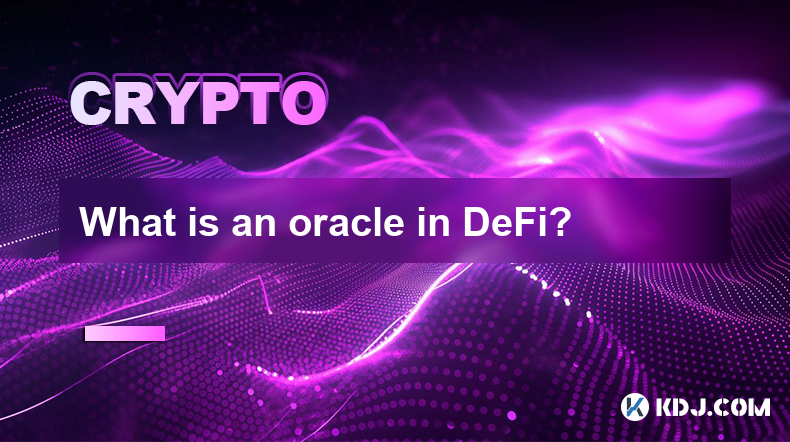
Key Points:
- Oracles bridge the gap between on-chain and off-chain data in DeFi, providing real-world information to smart contracts.
- Different oracle types exist, each with its own strengths and weaknesses, including centralized, decentralized, and hybrid oracles.
- Security and reliability are crucial concerns for oracles, as vulnerabilities can lead to significant financial losses in DeFi applications.
- Choosing the right oracle for a specific DeFi application depends on factors like data requirements, security needs, and cost considerations.
- The future of oracles involves advancements in decentralization, scalability, and security to enhance the reliability of DeFi protocols.
What is an Oracle in DeFi?
Decentralized Finance (DeFi) thrives on the principle of trustless and transparent transactions. However, smart contracts, the backbone of DeFi, operate solely on blockchain data. They lack the ability to access information from the outside world, such as the price of gold, the weather in Tokyo, or the outcome of a sporting event. This is where oracles come in. Oracles act as bridges, feeding real-world data into smart contracts, enabling DeFi applications to function effectively. Without oracles, many DeFi applications would be severely limited.
Types of Oracles:
Several types of oracles cater to different needs within the DeFi ecosystem. These include centralized, decentralized, and hybrid oracles. Centralized oracles rely on a single entity to provide data, creating a single point of failure and potential vulnerability. Decentralized oracles, conversely, distribute data provision across multiple independent nodes, enhancing security and resilience. Hybrid oracles combine aspects of both, aiming to balance security and efficiency.
Centralized Oracles:
These oracles source data from a single entity. While simpler to implement and often faster, they are susceptible to manipulation and single points of failure. A compromise of the central entity could compromise the entire system, potentially leading to significant financial losses within the DeFi application. This makes them a less desirable option for many critical DeFi applications.
Decentralized Oracles:
These oracles distribute the data source among numerous independent nodes. This redundancy enhances security and reliability. If one node fails or is compromised, the others continue to operate, maintaining the data stream. However, decentralized oracles can be more complex and slower than their centralized counterparts. Achieving true decentralization is a significant ongoing challenge.
Hybrid Oracles:
These oracles combine aspects of both centralized and decentralized models. They might use a decentralized network to validate data provided by a trusted, centralized source. This approach aims to achieve a balance between speed and security, leveraging the strengths of both models. The hybrid approach is a common strategy in the ongoing effort to improve oracle security and reliability.
Security Concerns in Oracle Systems:
Security is paramount for oracles, given their critical role in DeFi. Vulnerabilities in oracle systems can lead to significant financial losses and compromise the integrity of DeFi applications. Attacks can range from data manipulation to complete system compromises. Robust security measures, including robust cryptographic techniques and decentralized consensus mechanisms, are crucial.
Choosing the Right Oracle:
Selecting the appropriate oracle for a DeFi application involves careful consideration of various factors. The data requirements of the application, the desired level of security, and cost-effectiveness are all key considerations. High-security applications, such as those handling significant financial transactions, might opt for decentralized or hybrid oracles, despite their higher costs.
Future of Oracles in DeFi:
The future of oracles in DeFi involves ongoing efforts to improve decentralization, scalability, and security. Research into new consensus mechanisms and cryptographic techniques is underway. Improvements in scalability are vital to handle the increasing volume of data required by increasingly sophisticated DeFi applications. Ultimately, more robust and secure oracles are essential for the continued growth and adoption of DeFi.
Common Questions and Answers:
Q: What are the risks associated with using oracles in DeFi?
A: The primary risk is manipulation of the data provided by the oracle, which can lead to inaccurate smart contract execution and financial losses. Other risks include single points of failure (in centralized oracles), network attacks, and vulnerabilities in the oracle's software.
Q: How do decentralized oracles improve security?
A: Decentralized oracles distribute data sourcing across multiple independent nodes. This means that compromising a single node does not compromise the entire system. Consensus mechanisms ensure data integrity, making manipulation more difficult.
Q: What is the difference between a centralized and a decentralized oracle?
A: A centralized oracle relies on a single source for data, while a decentralized oracle uses multiple independent sources. Centralized oracles are faster and simpler but less secure, while decentralized oracles are more secure but potentially slower and more complex.
Q: Are hybrid oracles the best solution?
A: Hybrid oracles offer a compromise between speed and security, combining aspects of both centralized and decentralized approaches. Whether they are the "best" solution depends entirely on the specific needs and risk tolerance of the DeFi application. There is no one-size-fits-all answer.
Q: How can I verify the reliability of an oracle?
A: This is a complex question. You should look for transparency in the oracle's operations, including how data is sourced and validated. Audits by reputable security firms can also provide a degree of assurance, but no oracle is completely invulnerable. Understanding the oracle's architecture and its security mechanisms is crucial.
Disclaimer:info@kdj.com
The information provided is not trading advice. kdj.com does not assume any responsibility for any investments made based on the information provided in this article. Cryptocurrencies are highly volatile and it is highly recommended that you invest with caution after thorough research!
If you believe that the content used on this website infringes your copyright, please contact us immediately (info@kdj.com) and we will delete it promptly.
- US Market Activity Could Spark Bitcoin Rally, Analyst Says
- 2025-04-17 20:15:12
- Cardano (ADA) Price Action – April 15 to April 16, 2025
- 2025-04-17 20:15:12
- Bitcoin (BTC) Has Become a Risk Asset, Tracking the Aussie Dollar-Yen (AUD/JPY) Pair
- 2025-04-17 20:10:12
- BitBonds or the art of integrating bitcoin into Treasury bond financing
- 2025-04-17 20:10:12
- Auradine, a maker of computing equipment for bitcoin (BTC) mining and AI applications, said it raised $153 million
- 2025-04-17 20:05:12
- Dogecoin (DOGE) Team Opposes Michael Saylor's "Bitcoin is chess" Tweet Comparing BTC to Hungry Hungry Hippos Game
- 2025-04-17 20:05:12
Related knowledge
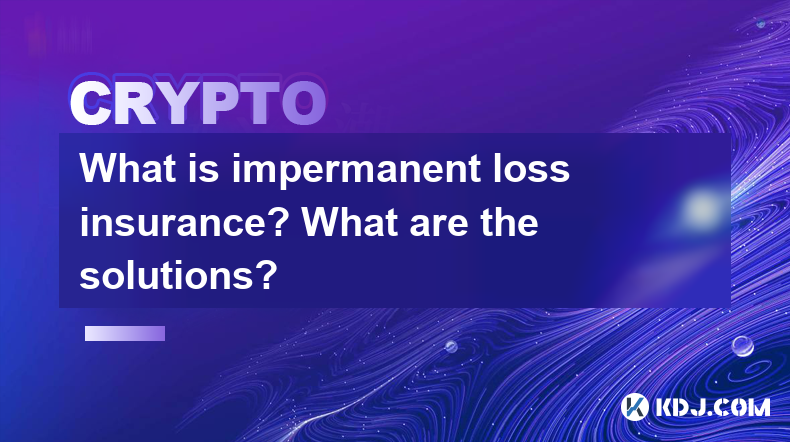
What is impermanent loss insurance? What are the solutions?
Apr 12,2025 at 01:14am
What is Impermanent Loss Insurance? What are the Solutions? Impermanent loss is a significant concern for liquidity providers in decentralized finance (DeFi) platforms. It occurs when the price of tokens in a liquidity pool changes compared to when they were deposited, leading to a potential loss if the provider decides to withdraw their liquidity. To m...
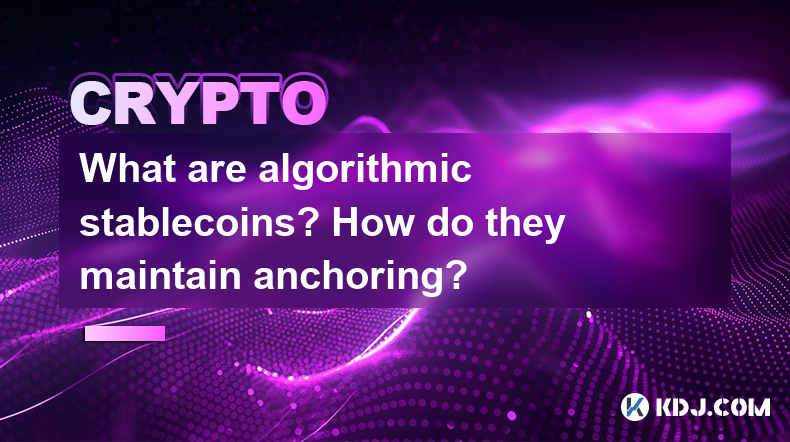
What are algorithmic stablecoins? How do they maintain anchoring?
Apr 12,2025 at 11:35am
Algorithmic stablecoins represent a fascinating and innovative segment within the cryptocurrency ecosystem. These digital assets are designed to maintain a stable value, typically pegged to a fiat currency like the US dollar, through the use of algorithms rather than traditional collateral. This approach distinguishes them from other types of stablecoin...
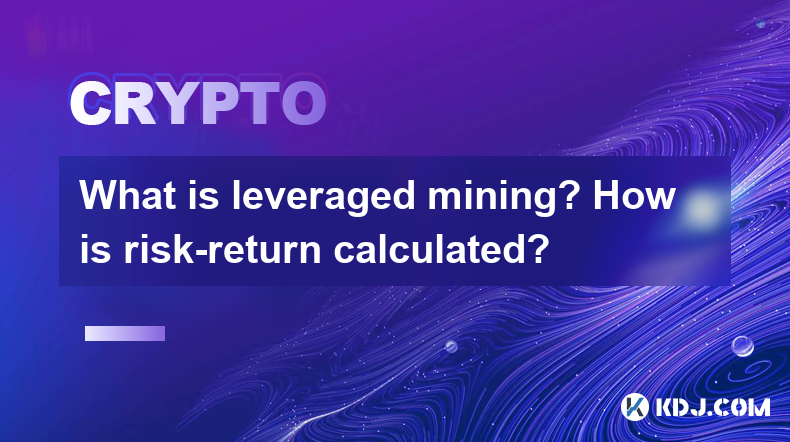
What is leveraged mining? How is risk-return calculated?
Apr 11,2025 at 04:07pm
What is Leveraged Mining? How is Risk-Return Calculated? Leveraged mining is a strategy used in the cryptocurrency space where miners borrow funds to increase their mining capacity and potential returns. This approach can amplify both profits and losses, making it a high-risk, high-reward endeavor. Understanding how to calculate the risk and return asso...
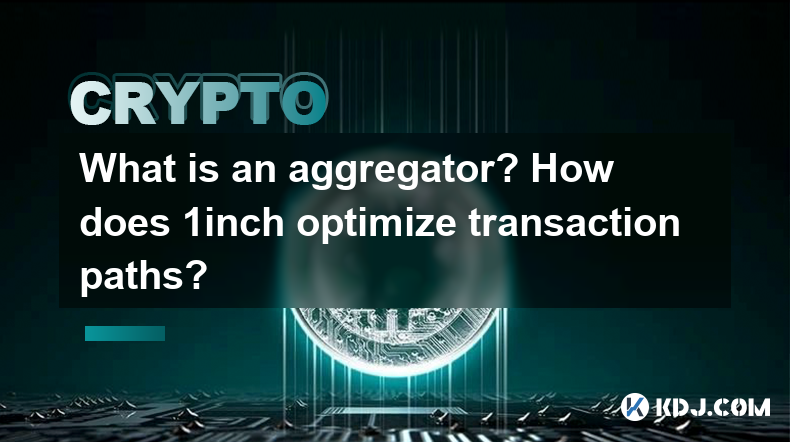
What is an aggregator? How does 1inch optimize transaction paths?
Apr 12,2025 at 05:00pm
An aggregator in the cryptocurrency space is a tool that compiles and compares data from multiple decentralized exchanges (DEXs) to find the best possible trading routes and prices for users. Aggregators are essential for traders looking to optimize their transactions, as they can automatically search through various liquidity sources to ensure the most...
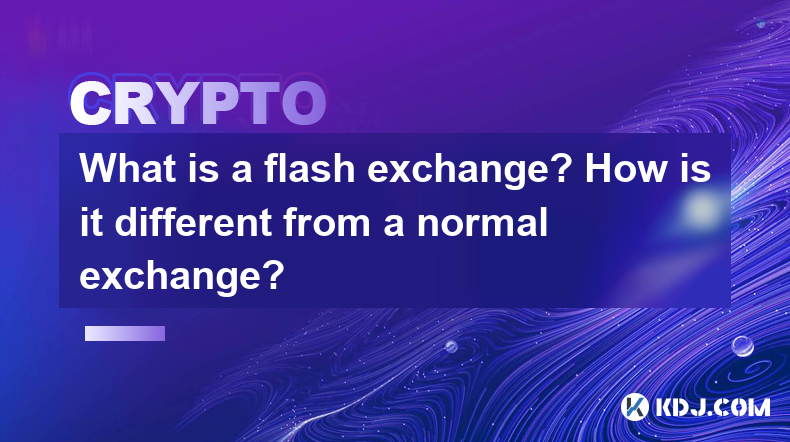
What is a flash exchange? How is it different from a normal exchange?
Apr 16,2025 at 03:43pm
A flash exchange, also known as a flash swap, is a relatively new concept within the cryptocurrency space that has gained significant attention due to its innovative approach to trading. Unlike traditional exchanges, flash exchanges leverage the power of decentralized finance (DeFi) protocols to enable instant, collateral-free trades. In this article, w...
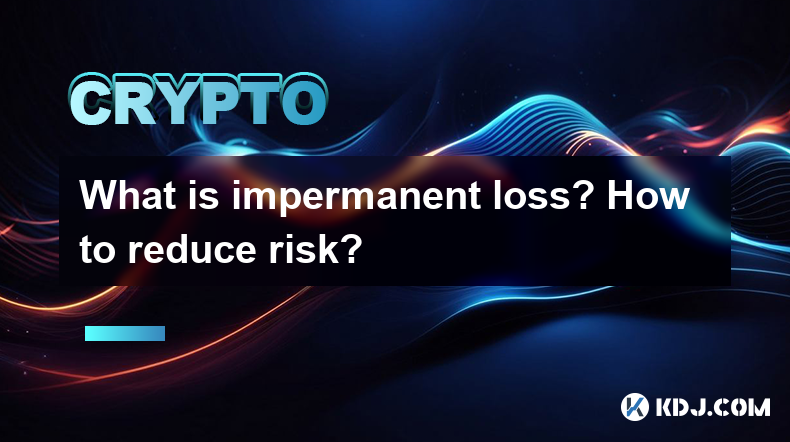
What is impermanent loss? How to reduce risk?
Apr 16,2025 at 11:14pm
What is Impermanent Loss? How to Reduce Risk? Impermanent loss is a term that frequently surfaces in the world of decentralized finance (DeFi), particularly when discussing liquidity provision on automated market makers (AMMs) like Uniswap or SushiSwap. Understanding this concept is crucial for anyone looking to engage in liquidity provision, as it dire...

What is impermanent loss insurance? What are the solutions?
Apr 12,2025 at 01:14am
What is Impermanent Loss Insurance? What are the Solutions? Impermanent loss is a significant concern for liquidity providers in decentralized finance (DeFi) platforms. It occurs when the price of tokens in a liquidity pool changes compared to when they were deposited, leading to a potential loss if the provider decides to withdraw their liquidity. To m...

What are algorithmic stablecoins? How do they maintain anchoring?
Apr 12,2025 at 11:35am
Algorithmic stablecoins represent a fascinating and innovative segment within the cryptocurrency ecosystem. These digital assets are designed to maintain a stable value, typically pegged to a fiat currency like the US dollar, through the use of algorithms rather than traditional collateral. This approach distinguishes them from other types of stablecoin...

What is leveraged mining? How is risk-return calculated?
Apr 11,2025 at 04:07pm
What is Leveraged Mining? How is Risk-Return Calculated? Leveraged mining is a strategy used in the cryptocurrency space where miners borrow funds to increase their mining capacity and potential returns. This approach can amplify both profits and losses, making it a high-risk, high-reward endeavor. Understanding how to calculate the risk and return asso...

What is an aggregator? How does 1inch optimize transaction paths?
Apr 12,2025 at 05:00pm
An aggregator in the cryptocurrency space is a tool that compiles and compares data from multiple decentralized exchanges (DEXs) to find the best possible trading routes and prices for users. Aggregators are essential for traders looking to optimize their transactions, as they can automatically search through various liquidity sources to ensure the most...

What is a flash exchange? How is it different from a normal exchange?
Apr 16,2025 at 03:43pm
A flash exchange, also known as a flash swap, is a relatively new concept within the cryptocurrency space that has gained significant attention due to its innovative approach to trading. Unlike traditional exchanges, flash exchanges leverage the power of decentralized finance (DeFi) protocols to enable instant, collateral-free trades. In this article, w...

What is impermanent loss? How to reduce risk?
Apr 16,2025 at 11:14pm
What is Impermanent Loss? How to Reduce Risk? Impermanent loss is a term that frequently surfaces in the world of decentralized finance (DeFi), particularly when discussing liquidity provision on automated market makers (AMMs) like Uniswap or SushiSwap. Understanding this concept is crucial for anyone looking to engage in liquidity provision, as it dire...
See all articles























































































